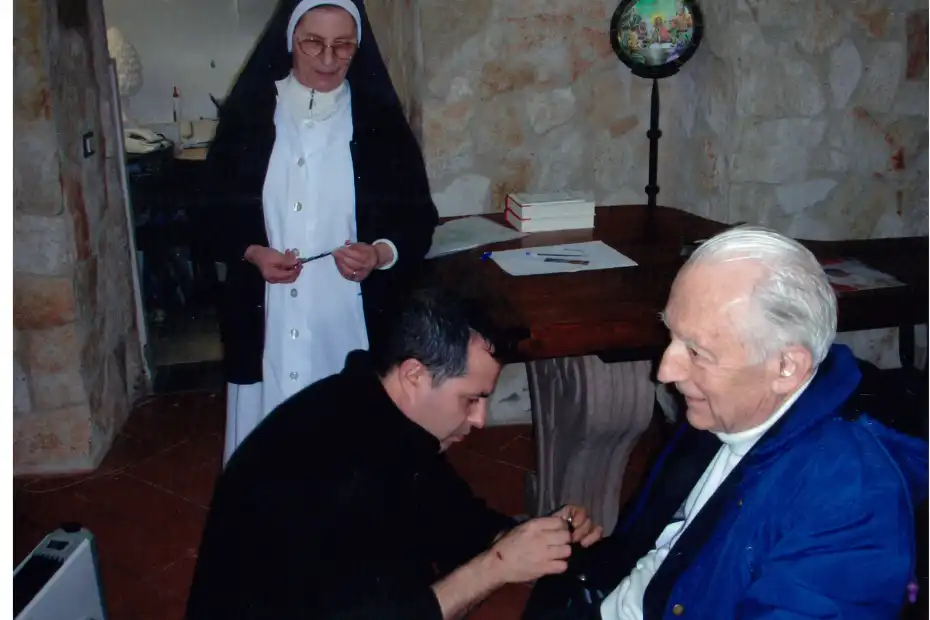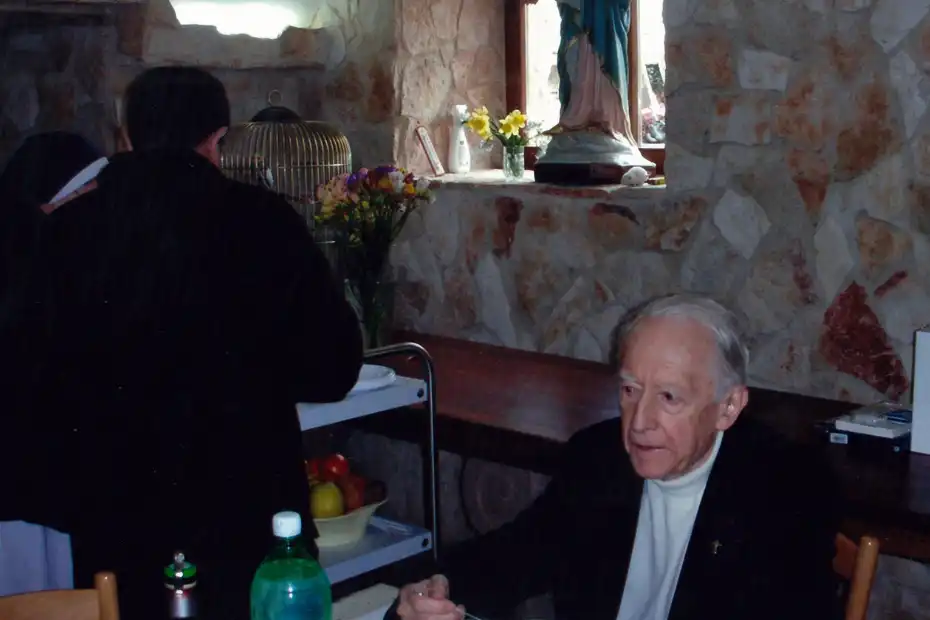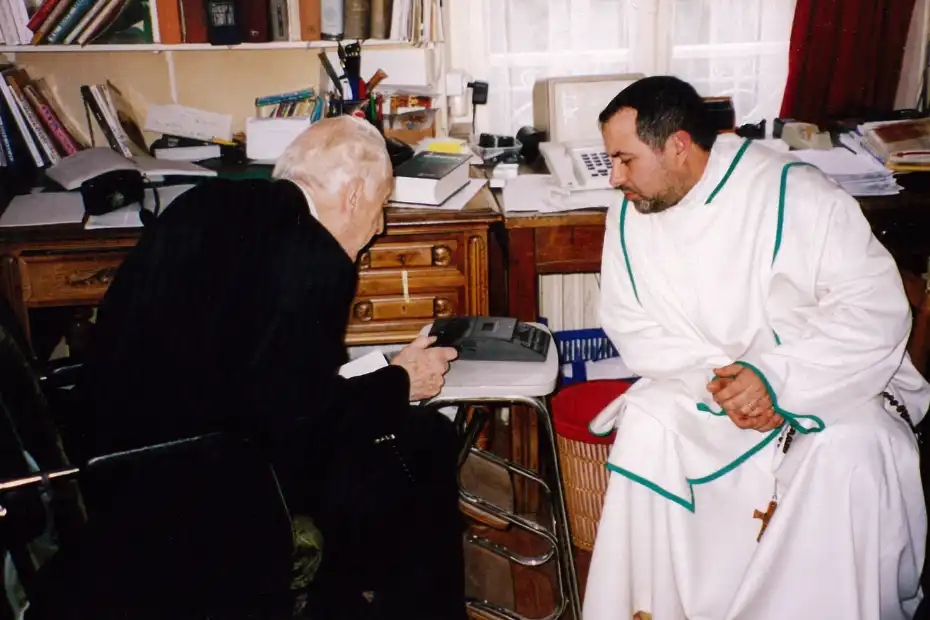Curriculum of Father Réné Laurentin: To talk about Father Réné Laurentin, the world’s greatest Mariologist, who recently passed away at the age of 100, is beyond bold and almost impossible. I am leafing through his recent autobiography (in French) dated April 2005 and do not know where to begin.
He was born in Tours, Oct. 19, 1917. He graduated in Thomist philosophy at the same time as he graduated in literature and philosophy from the Sorbonne University (1938). Upon completion of his first year of theology (1937.1938), he enlisted in the army as an infantry officer during the World War. He was decorated with the War Cross (two citations) and the Legion of Honor.
Taken prisoner in Belgium (May 1940) and taken to Germany, he taught Hebrew at the University of Oflag, where he continued his theological studies beginning in Mariology, under the direction of Father Génévois.
After graduating in theology (July 1946), he was ordained a priest on Dec. 8 by His Excellency Msgr. Blanchet, rector of the Catholic Institute. He prepared three theses (letters and theology) on the Virgin Mary, then traveled through the main European countries in search of documentation: the Sorbonne awarded him a Doctorate in Letters (free professorship) with honors, Feb. 9, 1953.
He was appointed professor of theology at the Catholic University of Angers in October 1955. Vice president of the French Association for Marian Studies (1962- 1977), Consultant to the Preparatory Commissions of the Second Vatican in 1960, then expert on the Council from 1962 – 1965, he became chronicler of the Council for the famous French newspaper “Figaro” from spring 1963. On its second edition, he was the first to predict the election of Pope Paul VI.
In 1953 Msgr. Théas asked him for “a theology of Lourdes.” The work was completed in more than 30 volumes. It helped extinguish the constant controversy of freethinking and renewed the pastoral care of Lourdes. This success resulted in a request for a similar study on Pontmain, the Miraculous Medal and Fatima, where he accepted a position as an advisor.Since 1983, he became, despite his reluctance, a specialist on all the current apparitions. He is continually invited to participate in countless radio and TV broadcasts in France, Germany, Italy, Argentina, Canada, Switzerland, Poland, the United States, Russia, and Venezuela.
WHO MORE THAN HE COULD WRITE A REPORT ABOUT FRA ELIA? So he invited him to his home accompanied by Sister Sunday and yours truly.
Monday, February 14, 2005. At the invitation of the famous Marian theologian Father Réné Laurentin, for an interview, Brother Elia accompanied by Father Jean Bernard, Sister Domenica and myself, arrived at the appointment at the convent of the Sisters of Notre Dame de Sion (their purpose is the conversion of the Jews) some thirty kilometers from Paris, slightly late. The enormous traffic, despite the hour not considered rush hour, eleven o’clock, forced us into long traffic jams and route changes, so that when we finally entered the convent chapel, the Mass celebrated by Father Laurentin had already begun. Without making the slightest noise we took our places in the last pew.
However, Father saw us and, at the appropriate moment, said the following words, “We offer this Mass for a friar who arrived from Italy sustained by the charisms of God.” These words surprised and moved me also because the Church is usually very cautious in pronouncing about new Charismatics, and Father Laurentin is certainly one of its most illustrious representatives, but in the case of Fra Elia he will certainly have researched and moreover read the wonderful interview that his right-hand man Patrick Sbalchiero had published in Chrétiens Magazine last November. In any case, it was after this interview that He himself invited to his home to meet him personally. And now, at last, we were here at his Mass but unfortunately Fra Elia, weakened by his Lenten torments and the strains of the last four days, was not well at all even though he claimed otherwise. “Let’s hope all is well,” I thought!
Meanwhile, the Mass had come to an end and, at the moment of “exchange a sign of peace,” Father Laurentin, once again giving a sign of benevolence to Fra Elia, came down from the altar, crossed the whole church to the pew, where Elia stood, and smilingly embraced him. Later, in his study, Fra Elia answered all her questions without hesitation.


Here is the report
Vincenzo Paglia, Bishop of Terni, (100,000 inhabitants with its environs numbering 60,000) found the time and courage to accommodate the alleged but singular case of Fra Elia. There, where other prelates make it a duty to ignore, exclude or repress unusual charisms according to administrative references common to civil society and the Church, in order to eliminate disruptive novelties, Msgr. Vincenzo Paglia was able to find his own discreet and organic place for Fra Elia in the diverse symphony of the diocese. He has observed him with sympathy and prudence, sometimes brought him in to better discern and place him, facilitated his material and spiritual construction work. In this case, in general, he has observed choirs of opposition to the Charismatics.
He observes day by day. His discernment about Fra Elia, based on observing facts, his deepening and traditional experience in the Church, have given him a clear conviction: THIS IS TRULY A PHENOMENON OF LIGHT. The good tree produces good fruit according to the fundamental criterion of Christ. The bishop does not stick to his episcopal charism, but nourishes it by the contacts followed according to the circumstances, which will verify his personal discernment and establish according to the multidisciplinary criteria that FRA ELIA IS NOT AN IMPOSER, but a man and a consistent Christian.
This will be one of the important stages of the “Fra Elia Foundation” . In our age, the long wave of the materialistic and agnostic tide, crushes faith on all sides. The signs of heaven are particularly useful in this asphyxiation to restore among people the sense of God and spirituality: we are not animals, we do not have to limit ourselves to our daily grind, but we come from further afield and are called to reach His Fullness of Love through the breath of Baptism and progressive conversion from animal selfishness to organic solidity, from eros to agape, from desire into gift, as Benedict XVI’s first encyclical says. It was a rejuvenation for me to pass by the Bishop of Terni, as well as among the old stones to which Fra Elia has restored order and life. You can feel the breath of another world, another life. These are important places confirming faith and hope.
